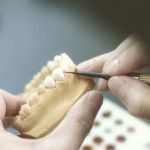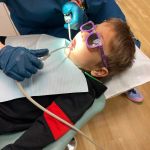
- 1. Understanding Dental Anxiety
- 2. Common Causes of Dental Anxiety
- 3. Effective Tips for Overcoming Dental Anxiety
- 4. The Benefits of Preparing for a Dental Visit
- 5. Seeking Professional Help for Severe Anxiety
1. Understanding Dental Anxiety
Dental anxiety is a common condition where individuals feel extreme fear or nervousness before visiting the dentist. This anxiety can stem from various factors, such as past negative experiences, fear of pain, or even the sound of dental equipment. Recognizing and addressing dental anxiety is important because it can prevent individuals from seeking necessary dental care. If you're someone who feels uneasy before a dental visit, you're not alone. It’s estimated that nearly 36% of people experience some form of dental anxiety.
2. Common Causes of Dental Anxiety
There are several reasons why someone may feel anxious about a dentist visit. Some of the most common causes include:
- Pain and Discomfort: Many people associate dental procedures with pain, which leads to anxiety.
- Negative Past Experiences: If someone has had a bad experience in the past, it can cause them to feel anxious about future visits.
- Fear of Loss of Control: Some individuals feel vulnerable or trapped in the dental chair, which triggers anxiety.
- Fear of Needles: For some, the idea of receiving injections or shots during dental work is a major source of fear.
- Sensory Sensitivity: The sounds, smells, and bright lights in a dental office can trigger discomfort or anxiety for certain people.
3. Effective Tips for Overcoming Dental Anxiety
Managing dental anxiety before your visit is possible with the right techniques. Here are some strategies that may help reduce fear and make your experience at the dentist more comfortable:
1. Communicate Your Concerns
One of the most effective ways to reduce anxiety is to talk openly with your dentist. Let them know if you’re feeling nervous or fearful about any part of the procedure. Dentists are trained to handle patients with anxiety and can offer accommodations to help you feel more at ease. This might include taking breaks during treatment or using a numbing agent to minimize discomfort.
2. Practice Relaxation Techniques
Learning relaxation techniques, such as deep breathing or visualization, can be incredibly helpful in calming your nerves before a dental appointment. Practice these techniques in the days leading up to your visit, and use them during the appointment to help stay calm. Simple breathing exercises can lower your heart rate and help you feel in control of the situation.
3. Consider Sedation Options
If your anxiety is severe, sedation dentistry might be an option worth exploring. Dentists offer different levels of sedation, from mild oral sedatives to more advanced options like nitrous oxide (laughing gas) or IV sedation. These options help relax patients, making dental procedures more tolerable.
4. Bring a Friend or Family Member
Having someone you trust accompany you to the dentist can provide emotional support and help you feel more comfortable. A familiar face can make the experience less daunting and provide a sense of security.
5. Focus on the Positive
Instead of focusing on the fear and discomfort of the dental visit, try to shift your focus to the benefits of getting dental care. Healthy teeth and gums are essential for overall health, and regular check-ups can prevent more serious problems in the future. Focusing on the positive outcome can help alleviate some of the anxiety surrounding the appointment.
4. The Benefits of Preparing for a Dental Visit
Proper preparation can help ease dental anxiety. By taking steps before the visit, you can reduce the level of stress you experience. Preparing mentally and physically ensures that you approach your appointment with a calm and collected mindset. If you're worried about pain or discomfort, talk to your dentist beforehand about numbing options. Additionally, try to schedule your appointment at a time when you're feeling relaxed and not rushed, which can help reduce anxiety.
5. Seeking Professional Help for Severe Anxiety
In some cases, dental anxiety can be so severe that it interferes with a person’s ability to receive necessary dental care. If this is the case, seeking professional help from a therapist or counselor may be beneficial. Cognitive-behavioral therapy (CBT) is a proven method for helping individuals manage anxiety, and a mental health professional can guide you through the process. If dental anxiety is affecting your quality of life, professional help can make a significant difference in how you approach dental visits.
Remember, overcoming dental anxiety takes time, but with the right strategies, it’s possible to manage and reduce the fear you may feel before a visit. If you're looking for tips and services that will help make your dental experience more comfortable, Dentistry Toothtruth offers a wide range of products and services to ensure your dental visits are as stress-free as possible.







 iSmiles Kids Dentistry4.0 (123 review)
iSmiles Kids Dentistry4.0 (123 review) Dr. Sam Saleh4.0 (37 review)
Dr. Sam Saleh4.0 (37 review) Peach Tree Dental4.0 (330 review)
Peach Tree Dental4.0 (330 review) Lino Lakes Family Dentistry5.0 (110 review)
Lino Lakes Family Dentistry5.0 (110 review) Diamond Braces Orthodontist: Braces & Invisalign4.0 (746 review)
Diamond Braces Orthodontist: Braces & Invisalign4.0 (746 review) Sahara Dental Center part Brident Dental & Orthodontics4.0 (788 review)
Sahara Dental Center part Brident Dental & Orthodontics4.0 (788 review) The Importance of Oral Health Education During Pregnancy for a Healthy Pregnancy
The Importance of Oral Health Education During Pregnancy for a Healthy Pregnancy Best Tips for Brushing Your Teeth Properly for Healthy Gums: Essential Techniques for Oral Health
Best Tips for Brushing Your Teeth Properly for Healthy Gums: Essential Techniques for Oral Health Why Skipping Dental Checkups Can Lead to Bigger Oral Health Problems
Why Skipping Dental Checkups Can Lead to Bigger Oral Health Problems Advantages of Porcelain Dental Restorations
Advantages of Porcelain Dental Restorations How Can Diabetes Cause Tooth and Gum Problems? Preventing and Managing Oral Health Issues
How Can Diabetes Cause Tooth and Gum Problems? Preventing and Managing Oral Health Issues Healthy Habits for Promoting Good Oral Health and Hygiene: Tips for a Healthy Smile
Healthy Habits for Promoting Good Oral Health and Hygiene: Tips for a Healthy Smile